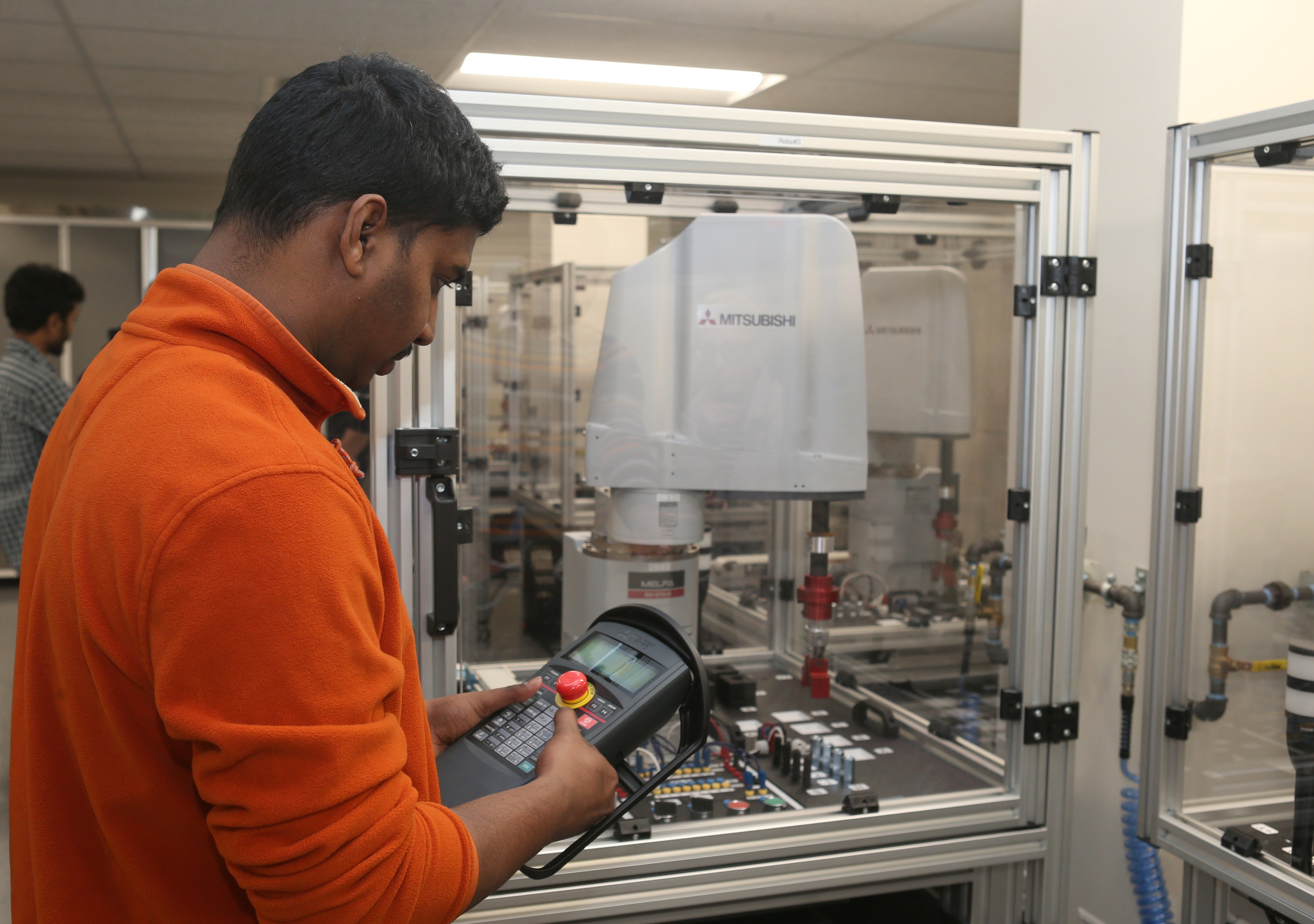
Bachelor of Science (B.S.)
Robotics Engineering
Embark on a career path of discovery, innovation and technological transformation with a robotics engineering degree from Bowling Green State University.
Robotics engineers pioneer lasting solutions for modern challenges. They make life easier, safer, eco-friendlier and faster. Those with robotics engineer jobs design, repair, maintain and replace the robots we use daily.
BGSU robotics engineering majors are detail-oriented, disciplined and dare to think outside the box.
They’re also in the right place. Northwest Ohio has the highest concentration of industrial robots in the U.S. Industry consultants estimate a national robotics skills gap of 2.4 million workers over the next decade. BGSU is in the epicenter of the manufacturing heartland and within a day’s reach of 60% of U.S. and Canadian supply chains.
A Bachelor of Science in robotics engineering (ROBO) from BGSU can perfectly position you to gain the practical skill and personal connections you need to launch an exciting and lucrative career. Choose from industries like aerospace, medicine, agriculture, manufacturing, defense, education, entertainment and more.
Why study robotics engineering at BGSU in Ohio?
- High demand. Automation is the buzzword in industries across the world - and robotics engineering is a big part of what makes automation possible. Those opportunities aren’t going anywhere.
- Small class sizes. Personal attention to each student’s success is the standard at BGSU.
- ABET-accredited program. Successful completion of an accredited program is a prerequisite to apply for the Ohio professional engineering license. Some international companies also require it.
- Regular on-campus recruiting. Ohio companies routinely recruit BGSU students. Many engineering students graduate with job offers in hand.
- STEM outreach. BGSU hosts the only BEST (Boosting Engineering, Science, and Technology) Robotics competition in Ohio.
- Professional connections. BGSU links ROBO students to professional organizations such as the Society of Manufacturing Engineers (SME), International Society of Automation (ISA) and IEEE Robotics and Automation Society.
Employment of robotics/mechanical engineers is expected to grow 10% in the next 10 years – far faster than the average for all occupations.
Sources: Bureau of Labor Statistics
BGSU robotics laboratories for next-level learning
Part of what sets BGSU apart from other engineering programs is our expansive, state-of-the-art laboratory facilities, more than a dozen in all. We believe that technology is best taught hands-on. This is especially true for robotics engineers.
Laboratory facilities most commonly used by our ROBO majors include:
- RIXAN Robotics Lab (3,300 square feet)
- Robotics Training Lab (6,400 square feet)
- Mobile Robotics Lab (5,000 square feet)
- Control and Instrumentation Lab (3,000 square feet)
- AI & VR Lab (1,500 square feet)
All this is in addition to more than 22,000 square feet of support spaces: project rooms, maker spaces, an innovation center, conference rooms, project rooms, a Hazmat Room, tech store, breakout areas and more.
Available equipment includes programmable AGV platforms, industrial 4.0 robot systems, machine vision systems (allowing robots to “see” and interpret surroundings), a range of sensors and actuators, control systems, mechatronic systems and more.
At BGSU, our engineering laboratories are more than simple learning spaces. They’re incubators of innovation.
Career - what can you do with a robotics engineering degree?
Ohio is an established tech hub that is home to a host of sought-after companies that routinely recruit BGSU students for coveted positions. It ranks No. 5 nationally for the highest employment level of robotics/mechanical engineers, according to the U.S. Bureau of Labor Statistics. Many engineering students graduate with job offers in hand.
Graduates with a robotics engineering degree from BGSU enter the work world ready to revolutionize. Advancing technologies and demand for automation has led to booming demand for robotics engineers. They work in university research labs, tech giant c-suites, high-level government agency offices and more.
Transportation, supply chains, construction, healthcare, surveillance, and even food industries all rely on robotics for fast, effective solutions. With a degree in robotics engineering, you can take your pick of a high-paying career path that aligns with your skills, strengths and passions.
- Master the fundamentals of robot kinematics and design.
- Program industrial robots.
- Analyze collaborative robot functions.
- Create intelligent control systems
- Harness machine learning to design autonomous robots
Career paths
- Robotics engineer
- Mechatronics engineer
- Automation systems designer
- AI and machine learning engineer
- Robotic process automation developer
- Unmanned vehicle engineer
- Robotics software engineer
- Human-robot interaction engineer
- Robotics startup founder
- Field robotics engineer
- Agricultural robotics engineer
Quick Facts from the Bureau of Labor Statistics
Curriculum
Dream it. Design it. Do it. That’s what our ROBO curriculum is all about.
A BGSU robotics engineering degree requires successful completion of 122 credit hours:
- 24 credit hours of general engineering courses
- 30 credit hours of robotics courses
- 12 credit hours of engineering electives
- 2 credit hours of paid co-ops
- 48-49 hours of other courses to satisfy ABET math and science requirements

Sample courses
- Industrial Robotics and Automation
- Robot Operating Systems
- Machine Vision in Robotics
- Machine Learning for Autonomous Systems
- Biomedical Device Technology
- Introduction to Robotics: Kinematics
The Robotics Engineering program is part of the School of Engineering in the BGSU College of Technology, Architecture and Applied Engineering.
Accreditation
The Robotics Engineering bachelor’s degree program at Bowling Green State University is ABET-compliant. Accreditation is officially granted once the first group of ROBO majors graduate. Accreditation is retroactive, so all BGSU ROBO graduates can claim completion of an ABET-accredited program.
Updated: 05/22/2024 01:56PM

